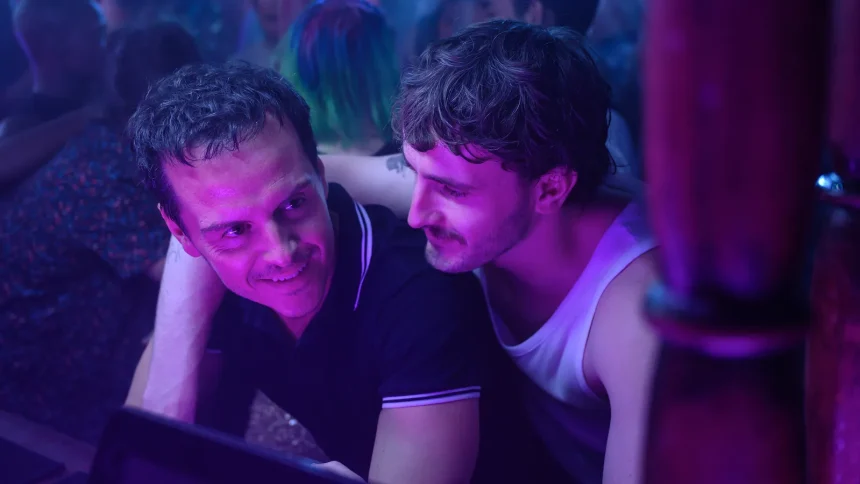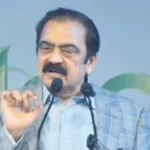The plot of All of Us Strangers makes it sound like a ghost story, and the details may lead you to expect violin strings and treacly melodrama. You can put those expectations aside. Andrew Haigh’s eloquent, beautifully nuanced film is something entirely different.
The ghosts are not ghoulish spectres but the ghosts of memory. As a middle-aged man, Adam—played by Andrew Scott at his emotionally piercing best—visits his parents, who died in a car crash just before he turned 12. Adam has a loving but clear-eyed, unsentimental view of his mother and father, played by Claire Foy and Jamie Bell with vibrant, down-to-earth realism. Haigh and his cast, including Paul Mescal as Adam’s new lover, give this film about loss, enduring love, and hope for the future such truth and poignance that it is easily among the best of the year.
From the start, Haigh creates a world with a tinge of unreality, not in its physical details—the look is crisp and clear, with slightly enhanced colors—but in its tone. When we first see Adam, his face appears gradually on screen, like a photograph being developed. He lives in a new, nearly-empty London high-rise, and the eerie silence and isolation are the perfect backdrop for the loneliness evident on his face. A screenwriter, he is working on a story about his parents. What he has so far is: EXT. SUBURBAN HOUSE, 1987.
Harry, a younger man played by Mescal with charm and a mischievous grin, is another tenant in the high-rise who one night drunkenly turns up at Adam’s door and invites himself in. Adam declines, one of many instances where Haigh remains true to this self-protective character. Soon, and tentatively, Adam changes his mind. The two men become sexual partners, possibly heading toward love.
Haigh, who has created psychologically sensitive stories in 45 Years (2015) and Weekend (2011), expertly balances that forward-looking relationship with Adam’s visits to the past. Researching his screenplay, he goes to the house where he lived as a boy and stands outside. Then, in a nearby park, he runs into his father, looking just as he did before he died, who takes him back to the house and his mother. The furniture hasn’t changed since Adam lived there; he is home. Adam’s grief is specific, but the film effectively plays off the common wish to revisit those we have lost, to fill them in on our lives, and to ask the questions we never could.
These ghosts exist entirely in Adam’s imagination, yet they have such life that you suspect he might be a very good screenwriter. The family acknowledges that they haven’t seen each other in some time but doesn’t yet speak about death. In two of the most honest and wrenching scenes, Adam visits each of his parents alone. When his mother asks if he has a girlfriend and he tells her he’s gay, she reacts not as he’d wish her to, but with the disappointment he suspects she really might have had. Left in the 1980s, she tells him, in Haigh’s pitch-perfect dialogue, “They say it’s a very lonely kind of life” and asks, “Don’t you want to marry and have children?” He tells her that men can marry now. “To each other?” she says.
Foy makes the character full of concern, even as she is unable to fully accept her son’s revelation. Without a word, Scott conveys that Adam is wounded and slightly angry. Adam has an even more expressive visit with his father. Bell captures how much this character is a family man of his time, well-intentioned and devoted but buttoned-down emotionally, until he isn’t.
Even as Adam keeps heading into the past, Harry tethers him to the present. Sharply defined scenes depict their intimate sex lives as well as their differences, as Haigh deftly fills in the context for these men of separate generations. Adam calls himself gay and can’t get used to the word queer. “It used to be such an insult,” he tells Harry, who says of men his age, “It’s probably why we hate ‘gay’ so much now. It was always like, ‘Your haircut’s so gay.’ ” In bits and pieces as their relationship grows, we learn why Harry himself feels so wounded, which Mescal shows with a subtlety suggesting that this apparently free-wheeling man uses charm, drink, and drugs to mask hurt and loneliness.
The film becomes more heartbreaking as it moves on. How could it not be? But every imagined scene remains full of authentic emotion. Scott makes Adam seem like a boy again in a lovely scene as he and his parents decorate a Christmas tree and listen to the Pet Shop Boys’ bouncy electronic-pop hit You Were Always on My Mind, his mother singing along words that resonate: “If I made you feel like second best, I’m so sorry, I was blind.”. But All of Us Strangers is hardly It’s a Wonderful Life, and Haigh takes it to an unexpected ending.
With its affecting hero and the parents he imagines coming back to life, All of Us Strangers has been making festival audiences weep since it premiered at the Telluride Film Festival in August. These four profound and tender performances, and Haigh’s uncompromising vision, make those tears feel entirely earned.







